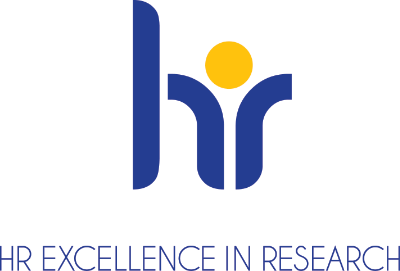To address challenges faced during project implementation, the University of Split has introduced a set of project procedures and tools, including a Regulation on project application and implementation. These measures, applicable to all projects, have significantly improved proposal management and streamlined the preparation phase, benefiting researchers, university project office staff, and management.
They ensure timely project recognition, technical support, and responsible budget allocation, ultimately enhancing project success rates.
To initiate the project application process at the University of Split as a coordinator or project partner, please complete the online Project Intent Notification Form.
Please complete the form and submit it no later than 30 business days before the project application deadline. Within 3 business days, we will contact you and guide you through the further procedure.
You can find all additional information about the project application process at the University of Split in the important documents and application forms.

They ensure timely project recognition, technical support, and responsible budget allocation, ultimately enhancing project success rates.
To initiate the project application process at the University of Split as a coordinator or project partner, please complete the online Project Intent Notification Form.
Please complete the form and submit it no later than 30 business days before the project application deadline. Within 3 business days, we will contact you and guide you through the further procedure.
You can find all additional information about the project application process at the University of Split in the important documents and application forms.
The University's Office for Projects provides support to research, from the application for funding at local, national and international levels to the transfer of the results to the society. Our mission is to inform and support professors and researchers in performing research and securing research funding.
Our main activities:
Our main activities:
- promoting the involvement and participation of the university community in the projects
- providing information to professors and researchers on funding opportunities at local, national, European and international level
- supporting research proposals preparation and submission
- management of EU and other projects
- administrative and financial monitoring of projects in which the University of Split participates as the coordinator, partner or third party
Scientific research projects are mainly financed by means of the European Union, especially the European Structural and Investment Funds (ESIF) and the European Regional Development Fund (ERDF). In the period from 2019 to 2023, 42 projects financed by the European Union, foreign science foundations and the European Structural and Investment Funds are being implemented at the University of Split.A number of scientific research projects at the University of Split (since 2019) financed by EU funds.

STIM-REI Center of Excellence for Science and Technology
The University of Split is the coordinator of the STIM-REI Center of Excellence for Science and Technology-Integration of Mediterranean Region, which connects research with innovation and education within three areas of research:
• Advanced technology at nanoscale - focuses on renewable energy sources and nanotechnology for medical diagnostics by developing new materials for solar and fuel cells and designing new nanostructured biosensor materials for medical diagnostics,
• Water and Environment - includes the protection of water quality and quantity, the impact of climate change and blue biotechnology/marine bioresources for the bioeconomy,
• Education - follows new strategic frameworks for European cooperation in education and training and aims to establish new programs for entrepreneurship in the field of natural sciences and technology, including continuous education and ensuring its excellence.
The project is financed with EUR 4.933.333,00, it is led by Vlasta Bonačić-Koutecky (vbk@cms.hu-berlin.de), and it employs 14 young researchers, doctoral students and postdoctoral students. Two institutes are involved in the project as partners.
Faculty members of the University of Split participate as partners in five more Scientific Centers of Excellence (SCE):
STIM-REI Center of Excellence for Science and Technology
The University of Split is the coordinator of the STIM-REI Center of Excellence for Science and Technology-Integration of Mediterranean Region, which connects research with innovation and education within three areas of research:
• Advanced technology at nanoscale - focuses on renewable energy sources and nanotechnology for medical diagnostics by developing new materials for solar and fuel cells and designing new nanostructured biosensor materials for medical diagnostics,
• Water and Environment - includes the protection of water quality and quantity, the impact of climate change and blue biotechnology/marine bioresources for the bioeconomy,
• Education - follows new strategic frameworks for European cooperation in education and training and aims to establish new programs for entrepreneurship in the field of natural sciences and technology, including continuous education and ensuring its excellence.
The project is financed with EUR 4.933.333,00, it is led by Vlasta Bonačić-Koutecky (vbk@cms.hu-berlin.de), and it employs 14 young researchers, doctoral students and postdoctoral students. Two institutes are involved in the project as partners.
Faculty members of the University of Split participate as partners in five more Scientific Centers of Excellence (SCE):
- SCE for BioProspecting of the Adriatic Sea (BioProCro) gathers internationally recognized research groups in the fields of biotechnology, chemistry, pharmacology, microbiology, process engineering and ecology. This integration of research groups into a single, modern center contributes to innovative research into bioactive compounds from natural materials of the Croatian Adriatic. The project holder is Ruđer Bošković Institute, and one of the partners is the Faculty of Chemistry and Technology in Split, where the activity is led by Igor Jerković (ijerkovic@unist.hr). EUR 263.875,33 of non-refundable funds were approved for the University of Split.
- SCE for Quantum and Complex Systems, and Representations of Lie Algebras created a motivating and efficient atmosphere and a stable long-term financial framework for the training and development of young researchers. Skills that young researchers develop through work at the QuantiXLie Center are extremely valued in the IT, innovation, and financial sectors. The center is organized into two units: (i) Unit for Theory of Quantum and Complex Systems and (ii) Unit for Representation Theory of Lie algebras, Number Theory, and Related Structures. The project holder is the Faculty of Science of the University of Zagreb, and one of the partners is the Faculty of Science in Split with Gordan Radobolja (gordan@pmfst.hr) leading the activities.
- SCE for Personalized Health Care is an interdisciplinary center of excellence, designed as an efficient way of transferring knowledge and competences acquired in biotechnical sciences to basic and applied biomedical research. Research groups are complementary. One of the examples of synergistic activity between the scientific units of this SCE is the possibility of analyzing glycan biomarkers in the evaluation of the effect of the application of functional food in healthy subjects and patients.Center consists of two scientific units: Scientific unit for glycoscience research in which the School of Medicine in Split is a partner and the head of activities at the School of Medicine in Split is Ozren Polašek (ozren.polasek@mefst.hr). The School of medicine in Split was allocated EUR 426.666,00 for the implementation of activities and scientific unit for research, manufacturing and medical testing of functional food.
- SCE in Data Science and Cooperative Systems acts as a center for collaboration between the academic community and the business and public sector in the research and development of new methodologies and advanced engineering approaches for data science and cooperative systems. The project holder is the Faculty of Electrical Engineering and Computing of the University of Zagreb and one of the partners is the Faculty of Electrical Engineering, Mechanical Engineering and Naval Architecture in Split, where the activity is led by Nikola Godinović (nikola.godinovic@fesb.hr), who is also the head of the Data Science research unit of the strategic area of research "Multidisciplinary dana intensive applications: Particle and astroparticle physics"[NS1] . The center consists of two research units: the Research Unit for Data Science and the Research Unit for Cooperative Systems. The total funds allocated so far for the Faculty of Electrical Engineering, Mechanical Engineering and Naval Architecture in Split are EUR 265.000,00. .
- SCE for Integrative Bioethics was developed through a series of croatian and international projects and it operates according to a scientific program that includes various types of scientific activity (scientific research activity, construction of scientific infrastructure, education, journalistic activity, scientific dialogue, international cooperation and implementation of research results). The holder is the Faculty of Humanities and Social Sciences of the University of Zagreb, and one of the partners is the Faculty of Humanities and Social Sciences in Split. The head of the center at the Faculty of Humanities and Social Sciences in Split is Bruno Ćurko (bcurko@ffst.hr). Center at the Faculty of Humanities and Social Sciences in Split organizes various public forums and symposia related to bioethical issues, including issues from biomedicine, technology, ecology, ethics, etc. Members of the Center are particularly focused on the problems of animal ethics within the broader concept of cultural zoology (cultural animalistics), so in this regard, the Center's central activity in recent years has been the scientific and cultural manifestation Days of Cultural AnimaliSTics. [NS1]Nisam našla sluižbeni prijevod istraživanja
The University of Split cooperates with various institutions outside the EU. More than ten projects were financed with funds from outside the EU through cooperation with:
• The United States Department of Agriculture
• Research Council of Norway
• Canada - Lexaria,…
and other collaborations.
• The United States Department of Agriculture
• Research Council of Norway
• Canada - Lexaria,…
and other collaborations.
Among the projects financed by national funds, CSF projects stand out. Foundation was established to promote science, higher education and technological development in the Republic of Croatia and to support scientific, higher education and technological programs and projects. By supporting quality projects and researchers, the Foundation makes it possible to conduct top-quality research in Croatian scientific institutions, and thus also enables preparation for internationally competitive projects. Emphasis of the career development of young researchers is on: the inclusion of doctoral students in research work with the primary goal of producing a doctoral dissertation, reducing the average duration of doctoral studies and obtaining a doctoral dissertation in 4 years, and systematic monitoring and evaluation of the results achieved in doctoral studies and in scientific research work. The goal of the Foundation is to encourage scientific research and development in Croatia, and to increase the quality and influence of Croatian science at the international level. Foundation funds projects based on scientific excellence, and the quality and excellence of projects is assessed through a rigorous evaluation and selection process.
Development projects create added value and competitive ability of the University of Split. They also lead to the promotion of the existing system of science and higher education and improve teaching and professional activities. Development projects are important for success because they enable the creation of new products and services, and contribute to efficiency and productivity. These projects deal with various topics, including climate change, energy efficiency, sustainable development, new technologies and other topics. In the period from 2019 to 2023, 60 development projects are being implemented at the University of Split, which are mainly financed from the Erasmus+ program, the European Social Fund, the European Regional Development Fund and cross-border cooperation programs.
In particular, following three projects should be highlighted, through the implementation of which considerable investment was made in the scientific research structure.
Functional integration of the University of Split, PMF/PFST/KTF, through the development of scientific and research infrastructure in the three faculties building
Through a project worth EUR 11.300.306,31 financed from the European Regional Development Fund, modern equipment was acquired that will enable the further development of collaborative projects with local and foreign partners, the economic and public sector, all with the aim of increasing scientific research and developing the economy of Croatian Adriatic based on knowledge.
Thus, through the project, the authenticity of the painting by the famous Croatian artist Julij Knifer, as well as the determined age of the archaeological artifacts exhibited in the Archaeological Museum in Split and the Hvar Heritage Museum on Hvar, were analyzed using the µ-XRF spectrometer acquired by the project.Additionaly, the thermographic cameras acquired through the project were borrowed by students from the III. Gymnasium Split for research purposes in the National Biology Competition, while colleagues from the Institute of Physics were assisted in the analysis of samples as part of a scientific project with acquired electron microscopes (transmission and scanning).The project has also improved energy efficiency and the use of renewable energy. A unified management system has been implemented for the building of three faculties in order to reduce maintenance costs, energy costs and optimize the usage of all rooms, laboratories and research equipment. Furthermore, the number and quality of scientific research papers and projects, as well as the number of researchers and collaboration agreements with the industry, is expected to encrease. The University of Split is the project leader and the partners are: the Faculty of Chemistry and Technology in Split with the lead of (jozicd@ktf-split.hr), the Faculty of Science in Split with the lead of Viljemka Bučević (viljemka.bucevic.popovic@pmfst.hr), Vladimir Pleština (vladimir.plestina@pmfst.hr) and Perica Bošković (pboskovic@pmfst.hr and the Faculty of Maritime Studies in Split with the lead of Ivan Komar (ivan.komar@pfst.hr). The following images show a small part of the equipment acquired through the project.
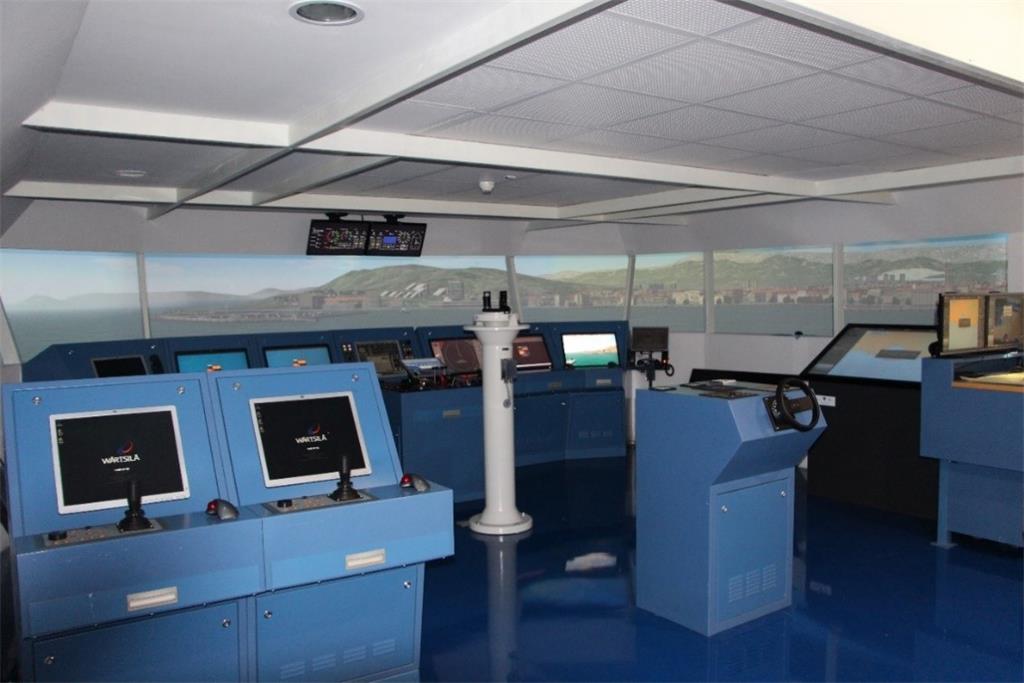 Nautical Laboratory (Faculty of Maritime Studies in Split)
Nautical Laboratory (Faculty of Maritime Studies in Split)
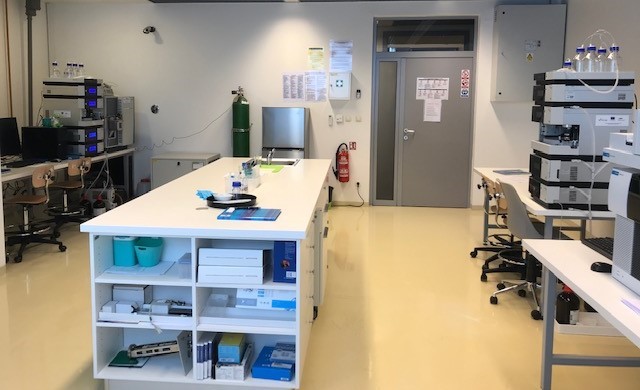
Chromatography Laboratory (Faculty of Chemistry and Technology in Split)
INFRA Project - From implementation of contemporary scientific and research infrastructure at FGAG to smart specialisation in green and energy efficient building
Trough a project worth 11.216.909,07 EUR, funded by the European Regional Development Fund, 11 laboratories at the Faculty of Civil Engineering, Architecture, and Geodesy (FGAG) was renovated, equipped, and arranged: Geotechnical Laboratory, Hydrotechnical Laboratory, Laboratory for Materials, Laboratory for Seismic Testing, Laboratory for Constructions, Laboratory for Numerical Modeling, Laboratory for Geographic Information Systems and Decision Support Modeling, Laboratory for Geodesy and Ggeoinformatics, Laboratory for Implementing Contemporary Technologies in Architecture, Laboratory for Traffic Roads, Measuring Station for Wind Energy. The implementation of the project has raised the level of scientific research activities, projects, innovations and patent applications in the areas of green and sustainable construction, environmental care and sustainable urban planning for smart cities and transportation. Additionally, the new scientific research infrastructure has facilitated the participation of scientific research groups in the future project-oriented scientific work. The experience gained is a guarantee of further successful development of scientific research activities and infrastructure in the field of construction in Split, Dalmatia and the Republic of Croatia. The Faculty of Civil Engineering, Architecture and Geodesy Split is the project holder, and the project manager is Nikša Jajac (niksa.jajac@unist.hr). The following picture shows the Geotechnical Laboratory financed by the project.
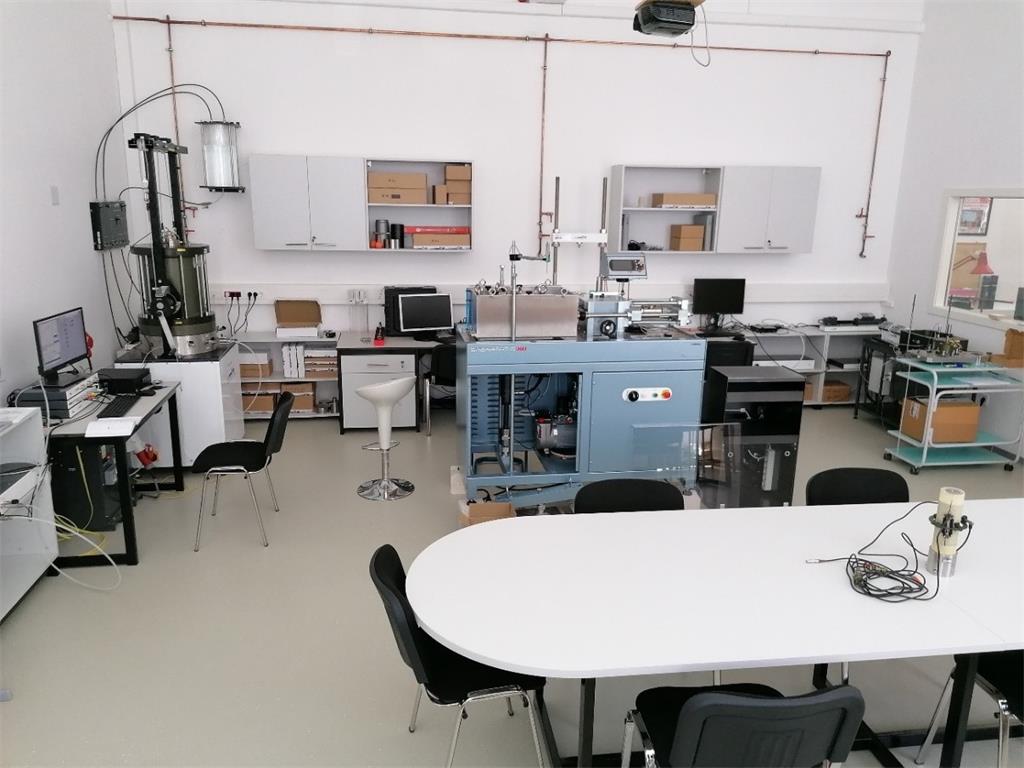 Geotechnical Laboratory (Faculty of Civil Engineering, Architecture and Geodesy in Split).
Geotechnical Laboratory (Faculty of Civil Engineering, Architecture and Geodesy in Split).
Operationalization of newly-built facility for experimental animals at the University of Split
The project is worth EUR 2.550.180,83 and is financed from the European Regional Development Fund. Housing for experimental animals is the fundamental scientific infrastructure of every country, and most of the pathophysiological mechanisms of disease occurrence are discovered in experimental animal models where the disease can be carefully studied and new therapies can be found and tested. The housing for experimental animals at the University of Split consists of a breeding and technical part (mice breeding, rat breeding, room for embryo transfers and accompanying technical rooms) and an experimental part, i.e. the laboratory of the Center for Translational Research in Biomedicine (operating rooms, five adaptable laboratories for conducting experiments and technical premises). The University of Split is the project holder, the School of Medicine in Split is the partner and Janoš Terzić (janos.terzic@mefst.hr) is the project manager. The following pictures show part of the purchased equipment from the project.
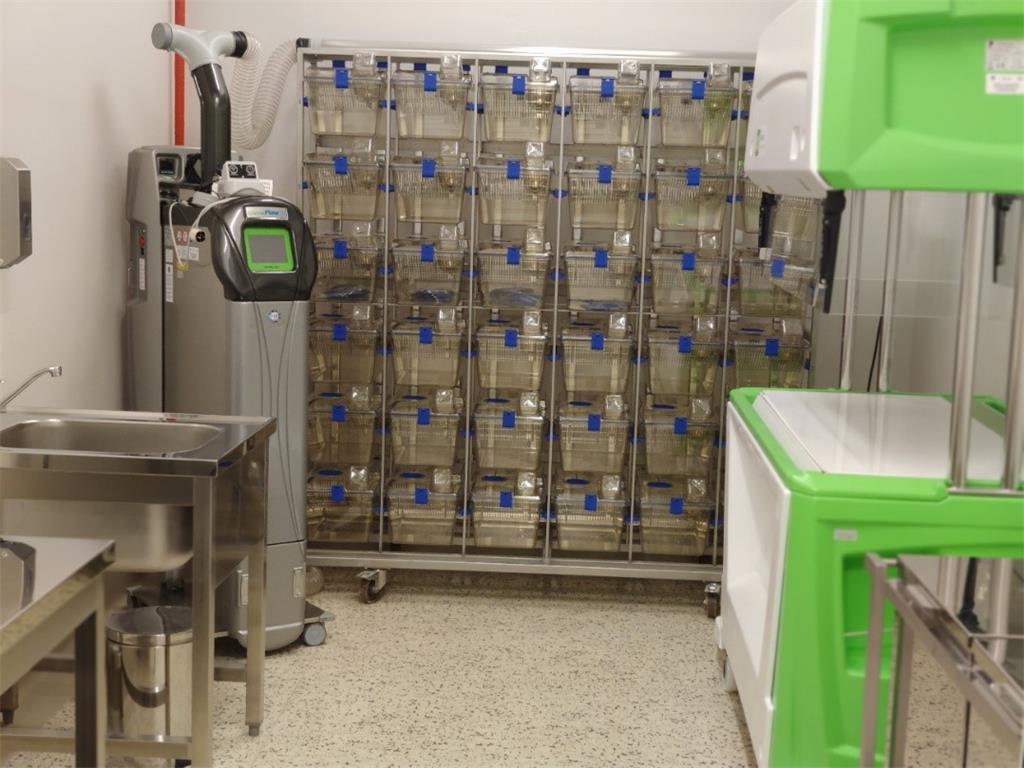 System for keeping experimental animals (School of Medicine in Split).
System for keeping experimental animals (School of Medicine in Split).
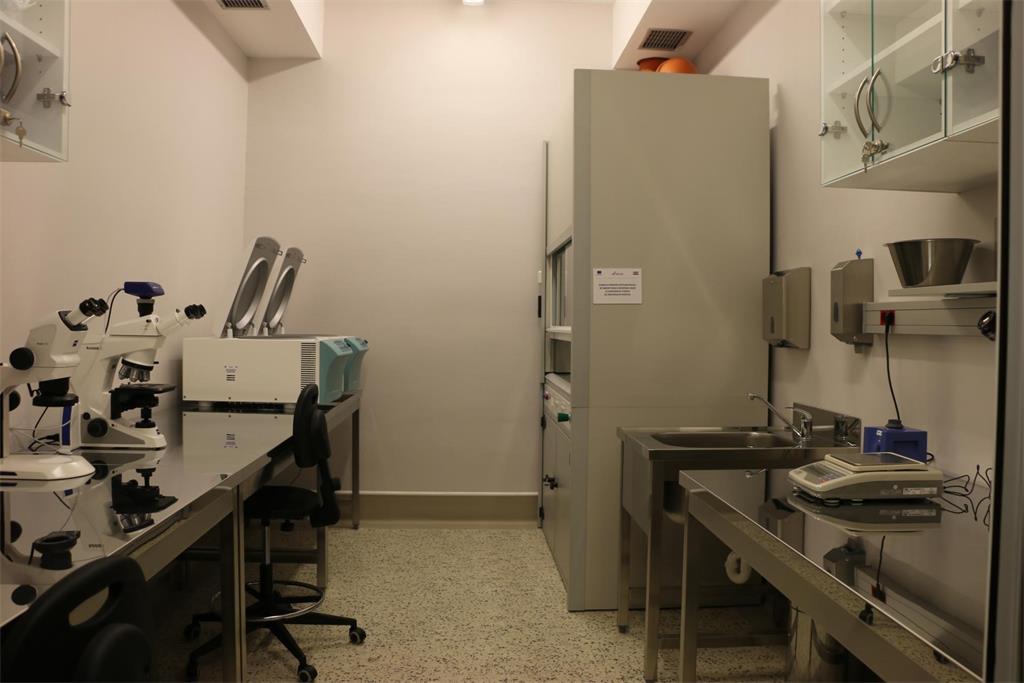 Laboratory of the Center for Translational Research in Biomedicine (School of Medicine in Split).
Laboratory of the Center for Translational Research in Biomedicine (School of Medicine in Split).
Science and Innovation Center of the University of Split
The Science and Innovation Center project at the University of Split - SIC, with a total value of 1.050.037,09 EUR, was co-financed by the European Regional Development Fund through the "Preparation of IRI Infrastructure Projects[NS1] " Call. The subject of the project is the preparation of project-technical documentation and, consequently, obtaining the necessary construction permit based on which the construction of the future building is planned. The purpose of the project is to create conditions for the establishment of a Science and Innovation Center in Split within the Campus area, aiming to reduce the current weaknesses of the existing infrastructure. The establishment of the Science and Innovation Center at the University of Split would ensure better implementation of advanced and applied research, participation in competitive projects, creation of centers of excellence, and improvement of collaboration with the business sector. The research and innovation infrastructure will be open to all research groups at the University and beyond, achieving maximum utilization as well as inter-institutional, inter-sectoral, and transdisciplinary cooperation. The University of Split is the project leader.
[NS1]Nisam našla sliužbeni prijevod
In particular, following three projects should be highlighted, through the implementation of which considerable investment was made in the scientific research structure.
Functional integration of the University of Split, PMF/PFST/KTF, through the development of scientific and research infrastructure in the three faculties building
Through a project worth EUR 11.300.306,31 financed from the European Regional Development Fund, modern equipment was acquired that will enable the further development of collaborative projects with local and foreign partners, the economic and public sector, all with the aim of increasing scientific research and developing the economy of Croatian Adriatic based on knowledge.
Thus, through the project, the authenticity of the painting by the famous Croatian artist Julij Knifer, as well as the determined age of the archaeological artifacts exhibited in the Archaeological Museum in Split and the Hvar Heritage Museum on Hvar, were analyzed using the µ-XRF spectrometer acquired by the project.Additionaly, the thermographic cameras acquired through the project were borrowed by students from the III. Gymnasium Split for research purposes in the National Biology Competition, while colleagues from the Institute of Physics were assisted in the analysis of samples as part of a scientific project with acquired electron microscopes (transmission and scanning).The project has also improved energy efficiency and the use of renewable energy. A unified management system has been implemented for the building of three faculties in order to reduce maintenance costs, energy costs and optimize the usage of all rooms, laboratories and research equipment. Furthermore, the number and quality of scientific research papers and projects, as well as the number of researchers and collaboration agreements with the industry, is expected to encrease. The University of Split is the project leader and the partners are: the Faculty of Chemistry and Technology in Split with the lead of (jozicd@ktf-split.hr), the Faculty of Science in Split with the lead of Viljemka Bučević (viljemka.bucevic.popovic@pmfst.hr), Vladimir Pleština (vladimir.plestina@pmfst.hr) and Perica Bošković (pboskovic@pmfst.hr and the Faculty of Maritime Studies in Split with the lead of Ivan Komar (ivan.komar@pfst.hr). The following images show a small part of the equipment acquired through the project.
 Nautical Laboratory (Faculty of Maritime Studies in Split)
Nautical Laboratory (Faculty of Maritime Studies in Split)
Chromatography Laboratory (Faculty of Chemistry and Technology in Split)
INFRA Project - From implementation of contemporary scientific and research infrastructure at FGAG to smart specialisation in green and energy efficient building
Trough a project worth 11.216.909,07 EUR, funded by the European Regional Development Fund, 11 laboratories at the Faculty of Civil Engineering, Architecture, and Geodesy (FGAG) was renovated, equipped, and arranged: Geotechnical Laboratory, Hydrotechnical Laboratory, Laboratory for Materials, Laboratory for Seismic Testing, Laboratory for Constructions, Laboratory for Numerical Modeling, Laboratory for Geographic Information Systems and Decision Support Modeling, Laboratory for Geodesy and Ggeoinformatics, Laboratory for Implementing Contemporary Technologies in Architecture, Laboratory for Traffic Roads, Measuring Station for Wind Energy. The implementation of the project has raised the level of scientific research activities, projects, innovations and patent applications in the areas of green and sustainable construction, environmental care and sustainable urban planning for smart cities and transportation. Additionally, the new scientific research infrastructure has facilitated the participation of scientific research groups in the future project-oriented scientific work. The experience gained is a guarantee of further successful development of scientific research activities and infrastructure in the field of construction in Split, Dalmatia and the Republic of Croatia. The Faculty of Civil Engineering, Architecture and Geodesy Split is the project holder, and the project manager is Nikša Jajac (niksa.jajac@unist.hr). The following picture shows the Geotechnical Laboratory financed by the project.
 Geotechnical Laboratory (Faculty of Civil Engineering, Architecture and Geodesy in Split).
Geotechnical Laboratory (Faculty of Civil Engineering, Architecture and Geodesy in Split).Operationalization of newly-built facility for experimental animals at the University of Split
The project is worth EUR 2.550.180,83 and is financed from the European Regional Development Fund. Housing for experimental animals is the fundamental scientific infrastructure of every country, and most of the pathophysiological mechanisms of disease occurrence are discovered in experimental animal models where the disease can be carefully studied and new therapies can be found and tested. The housing for experimental animals at the University of Split consists of a breeding and technical part (mice breeding, rat breeding, room for embryo transfers and accompanying technical rooms) and an experimental part, i.e. the laboratory of the Center for Translational Research in Biomedicine (operating rooms, five adaptable laboratories for conducting experiments and technical premises). The University of Split is the project holder, the School of Medicine in Split is the partner and Janoš Terzić (janos.terzic@mefst.hr) is the project manager. The following pictures show part of the purchased equipment from the project.
 System for keeping experimental animals (School of Medicine in Split).
System for keeping experimental animals (School of Medicine in Split). Laboratory of the Center for Translational Research in Biomedicine (School of Medicine in Split).
Laboratory of the Center for Translational Research in Biomedicine (School of Medicine in Split).Science and Innovation Center of the University of Split
The Science and Innovation Center project at the University of Split - SIC, with a total value of 1.050.037,09 EUR, was co-financed by the European Regional Development Fund through the "Preparation of IRI Infrastructure Projects[NS1] " Call. The subject of the project is the preparation of project-technical documentation and, consequently, obtaining the necessary construction permit based on which the construction of the future building is planned. The purpose of the project is to create conditions for the establishment of a Science and Innovation Center in Split within the Campus area, aiming to reduce the current weaknesses of the existing infrastructure. The establishment of the Science and Innovation Center at the University of Split would ensure better implementation of advanced and applied research, participation in competitive projects, creation of centers of excellence, and improvement of collaboration with the business sector. The research and innovation infrastructure will be open to all research groups at the University and beyond, achieving maximum utilization as well as inter-institutional, inter-sectoral, and transdisciplinary cooperation. The University of Split is the project leader.
[NS1]Nisam našla sliužbeni prijevod




